An IMF agreement for a loan to Egypt provides stability, confidence and international support for fiscal consolidation and structural reform. We listed progress toward an IMF agreement as one of the factors that could help stabilise Egypt’s ‘B+’/Negative rating in June. Other considerations include the emergence of a stable governing structure, and economic and structural policy reforms.
The IMF programme will provide some breathing space to implement fiscal reforms and alleviate pressure from a weak balance of payments. Reserves have more than halved since the end of 2010 as a result of a fall in exports, tourism receipts and FDI. Occasional injections of bilateral financing have been necessary to prevent import cover falling below three months.
The programme includes plans to cut a budget deficit of almost 11% of GDP in 2011-2012 – to 8.5% by 2013-2114 – and to record a primary surplus the following year. The government will attempt to do this via spending cuts – energy subsidiary reform, in particular – and tax reform.
Successful reform of fuel subsidies is the single-biggest reform the government can make to improve Egypt’s fiscal position or free up revenue to spend elsewhere. Fuel subsidies account for about 20% of government spending and 73% of all subsidies. The government has already started by targeting the subsidies more accurately toward the poor.
Plans to reform income tax and widen the sales tax should broaden the tax base and contribute to a reduction in the budget deficit. Agreement with the IMF is likely to encourage foreign inflows back into the local bond market, and the fiscal reforms will improve the budgetary position, both of which will reduce pressure on domestic financing – which had seen Treasury bill yields pushed up to the mid-teens, compared with inflation of 6.7%.
Structural reforms to support the development of the private sector and enable it to generate more employment opportunities have also been agreed. These will strengthen the weak business environment, and should have a beneficial impact on economic performance over the longer term.
Effective communication will be vital to gain popular acceptance in the turbulent prevailing political environment. Agreeing a new constitution is the next stage in the political transition. Disagreements between liberals and Islamists mean it will be difficult for the document to be finalised by the mid-December deadline. Once agreed, the constitution will be put to a referendum, which will be followed by a fresh parliamentary election. The timing of the election and shape of the new parliament is uncertain, but the prospect of polls in 2013 may affect the implementation of the planned fiscal retrenchment.
The USD4.8bn IMF loan carries a 1.06% interest rate. The loan is expected to be approved by the IMF board before the end of the year, with the first disbursement upon approval. The IMF programme also opens up finance from other bilateral and multilateral institutions, with the Fund estimating that its loan will be backed by almost USD10bn in loans and deposits from multilateral and bilateral donors.



